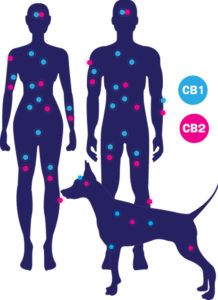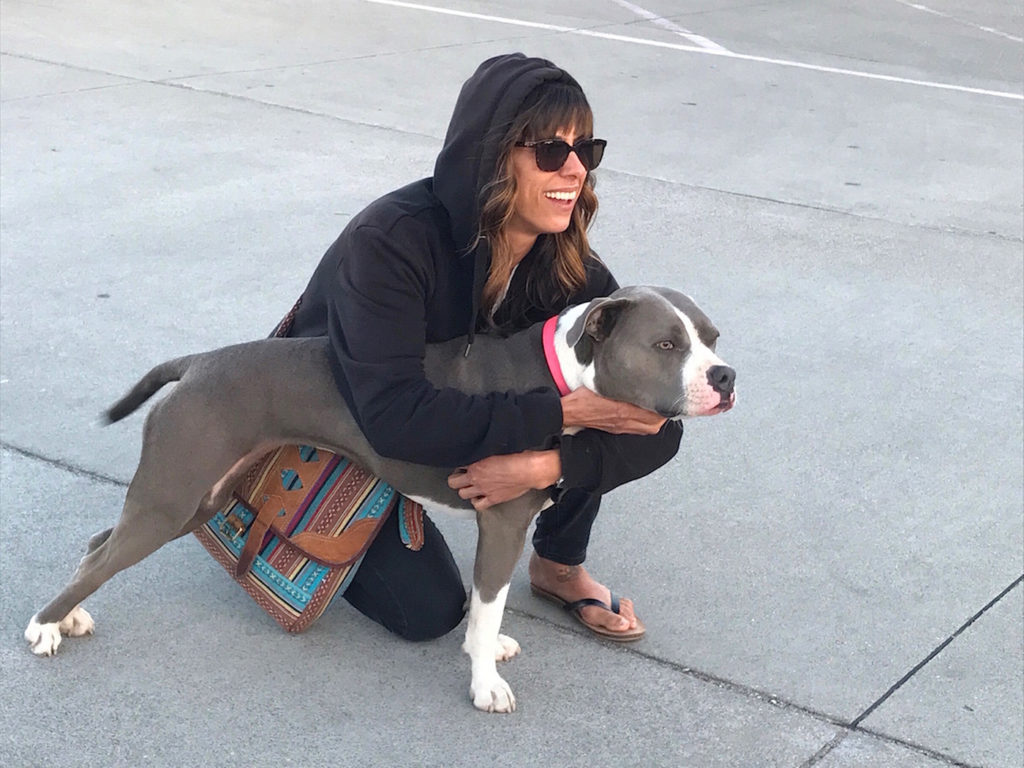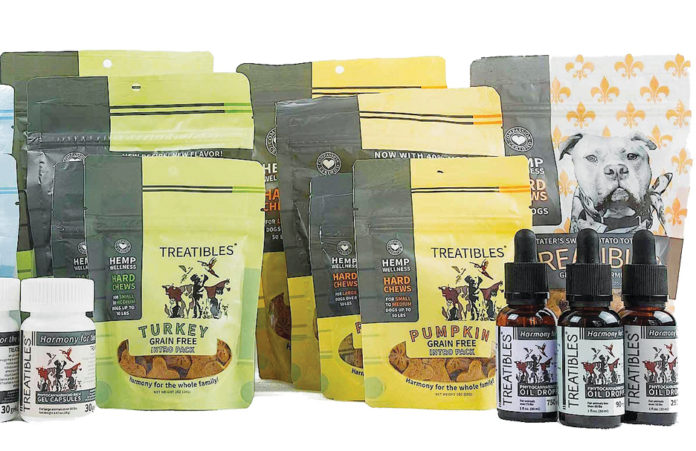Julianna Carella’s cannabis business has gone to the dogs. Or, perhaps more accurately, her business brought the dogs to cannabis. Pet products manufacturer Treatibles, which Carella founded in 2012, was first-to-market with CBD-only health-and-wellness nutraceuticals for animals.
Treatibles was not Carella’s first foray into the cannabis industry. In 2008, she founded Auntie Dolores, a maker of gourmet THC-infused medical edibles for people. The company did well, earning high praise for then-novel savory goodies like zesty nuts and pretzels. “At the time, there was a limited selection [of products on the market] and everything was sugary,” she said. “Savory cannabis edibles were our first big success.”
Treatibles was the second, taking off like a rocket. Today, CBD nutraceuticals for pets compose the majority of the two companies’ combined sales, Carella said. Largely, that’s because pet products lead the CBD market domestically and internationally, so Treatibles is where she and her team focus most of their attention.
That’s not to say they’re ignoring Auntie Dolores. Though the company continues to sell THC-infused gourmet edibles in Arizona, the AD staff lately has spent much of its time developing national sales channels for CBD oils and gel caps for human use—and explaining the brand’s name, still, after ten years. The name evokes “a sweet old lady laying out edibles on doilies,” Carella said, when in fact it’s a clever play on words: dolores is Latin for pain. Coupled with a homophone of “auntie,” the name becomes “anti-pain.
A new direction

The shift from THC-infused to CBD-focused happened gradually, Carella said, beginning at Auntie Dolores at about the same time Treatibles debuted. There’s always been a synergy between the two entities, she noted, since Treatibles products were developed in response to repeated customer questions about whether Auntie Dolores edibles were safe for pets. “They’re not,” Carella said. “THC can be harmful to our animal friends.”
But research and anecdotal reports indicate CBD can help relieve the same conditions in both people and critters: anxiety, inflammation, joint issues, digestive disorders, and seizures, among others. “The world needs [CBD],” Carella said. “Humans need it; animals need it. Every animal has an endocannabinoid system.” If that system becomes unbalanced by disease or injury, the addition of phytocannabinoids—naturally occurring substances, including CBD, in marijuana and hemp—can help provide support for recovery.
The realization set Carella and her team, which included veterinarians, on a development journey that resulted in four flavors of hard chews for dogs, dropper bottles of oil, and gel caps. The human products followed, and cat treats may be on the way. (Cats, being notoriously finicky, are difficult to please flavor-wise.) All products are Compassion Certified, made from human-grade ingredients, and contain third-party-lab-quantified amounts of phytocannabinoid-rich, whole-plant oil extracted from medicinal-grade hemp grown in Colorado, South Carolina, and Kentucky.
Embracing change
Carella said she was pleased, if not surprised, by the immediate positive response when the THC-free products debuted. “When our animals are healthy and happy, when our children and spouses and families are healthy and happy, so are we,” she said.
She’s beyond pleased—in fact, she’s thrilled—that by shifting from THC to CBD, her company started a trend that has become a virtual avalanche. More than 100 veterinarians and veterinary hospitals nationwide recommend Treatibles products, and both Auntie Dolores and Treatibles export products to the United Kingdom and Canada. CBD for pets is “a new product category,” Carella said. “We are now where glucosamine was twenty years ago. This is the market we wanted to create. We’re ecstatic.”

Looking ahead
No success comes without challenges, though. For Carella, the biggest challenge isn’t competition, but prohibition. That’s why she has made a primary corporate mission of educating consumers—and even more importantly, legislators—about CBD’s value as a nutraceutical. “Education is a big part of our identity,” she said. “We’ve seen a huge [positive] jump in public awareness. It’s awesome to see how much public perception has changed,” but work remains to be done. Despite growing consumer acceptance of and demand for cannabis products as a whole and CBD products in particular, “there’s a lack of knowledge among regulators” about a whole host of issues, including differences between the substances. “CBD is often lumped in with THC by default,” she said. “[CBD] is non-psychoactive. It’s medicine; a valuable chemical substance. That needs to be addressed ASAP.”
Nevertheless, there’s plenty to be excited about, she said. In December 2018, the Farm Bill lifted the eighty-year-old ban on hemp cultivation, which will be a boon for everyone who manufactures, sells, or consumes CBD products.
And Auntie Dolores and Treatibles have nowhere to go but up. Carella believes CBD products—sales of which are booming as consumers discover increasing availability online and in brick-and-mortar stores—will remain popular even after cannabis prohibition ends.
Auntie Dolores, if she’d ever existed, would be proud.


